- Home
- James A. Michener
Caravans Page 3
Caravans Read online
Page 3
“A thing like that is a national disgrace,” Nur said bitterly.
“Does the government know who the girls are? The saddle shoes, I mean?”
“Rumors whisper that one is Shah Khan’s granddaughter.”
“Does the old man know?” I probed.
“He’s the one who protested to the ambassador.”
“Is his granddaughter pretty?”
“They say she’s a beauty,” Nur replied. “I haven’t met anyone who’s seen her.”
“Is it true that Shah Khan has openly stated he’s opposed to the chaderi?” I asked, trying to review our intelligence on the man I was shortly to see.
“Of course. That’s why the mullahs tried to murder him last Ramadan.”
“I have to be there at four,” I repeated. Nur said he’d have the jeep ready, and I hurried to report to Captain Verbruggen. We arranged for the two Marines to be shipped out of the country that afternoon. They would ride an open truck down the long, perilous mountain passes to Peshawar, at the Indian end of the Khyber Pass. And in the years ahead they would relate such memories of Afghanistan as would inspire other young men to serve in distant nations.
Kabul was superb at the end of winter, particularly when the late afternoon sun rushed toward some rendezvous in Persia, to the west; for then the normal drabness of the miserable mud homes was masked in snow, and the solitary figures with carbines who moved across the empty fields outside of town bore an epic quality which captivated the eye. No stranger, at such a moment, could forget that he was in Asia.
Shah Khan lived well to the west, in a forbidding fortress hidden behind massive surrounding walls at least fifteen feet high. It must have required the forced labor of hundreds of convicts for many months to build the walls alone, for they enclosed many acres. This redoubtable establishment, complete with turrets and its own minaret, lay in the shadow of the beautiful Koh-i-Baba mountains, which were now snow-covered, reminding the foreigner that during the winter this city was practically inaccessible, unless one wished to risk his life on sloping mountain passes where each year many trucks were lost.
At the fortress gate through which one entered to visit Shah Khan there hung a bell cord, at which Nur Muhammad tugged vigorously, sending an echo through the frosty air. Normally the heavy gate would have been operated by some superannuated warrior who had served the owner in his youth, but when Nur yanked the cord a second time I thought I heard the pounding of horse’ hoofs. Then, instead of the miserly half-inch through which the guards customarily peered at intending visitors, the gates weré slammed violently open and a handsome man of thirty-six, astride a pawing white horse, greeted us.
“Mark Miller! Enter!” he cried in English. He was Moheb Khan, son of the Shah, educated at Oxford and at the Wharton School of Finance and Commerce. He held a responsible position in the Foreign Office, but on this day was affecting the dress of a prosperous mountain man, for he wore sheepskin trousers, an expensive embroidered vest, a long Russian-style fur coat, and a silver-gray karakul cap. He was clean-shaven, sharp-eyed and urbane, the educated Afghan at his best. I had talked with Moheb Khan several times before and had found him sophisticated in learning, dignified in bearing, and arrogant in judgment. He was tall and slim, with a large head marked by wavy black hair in which he took special pride. I respected him as one of the cleverest men I knew.
Whenever I was with Moheb I appreciated anew the fact that the future history of Afghanistan, if left to Afghans, would be determined by the struggle between the many bearded mullahs from the hills and the few young experts like Moheb, with degrees from Oxford or the Sorbonne or the Massachusetts Institute of Technology. I was not at all sure how the contest would eventuate, but it was clear that not only I but also all the people of all the embassies prayed that Moheb Khan and his young associates might win.
“Where’d you get the horse?” I asked, walking into the great compound, which in the nineteenth century had housed thousands of men during the frequent sieges.
“Look at the brand!” he cried, reaching down to shake my hand. “Pardon the glove,” he added, “but I’m afraid to drop the reins.”
He pointed to the horse’s left flank, where a scrawling W had been burned deep into the hair and skin.
“I don’t get it,” I said.
“Think, Miller!”
“W,” I repeated aloud. “I don’t know any ranch with that brand.”
“It’s sentimental!” Moheb laughed. “Think! Think!”
I could not guess what the cryptic brand was intended to signify, and when Nur Muhammad edged the jeep into the compound, the horse shied and darted off across the snowy plain—it would be ridiculous to call that huge expanse of land a garden—and I could well observe the fine horsemanship that Moheb Khan exhibited.
He brought the dashing animal back to the jeep, to familiarize the horse with the sound of a motor car, then leaped with agility to the ground beside me and cupped his hands near my right knee, all in one marvelously synchronized movement. “You ride,” he commanded.
There was something that no stranger ever became accustomed to in Afghanistan: the peremptory command of the educated Afghan. “You ride!” a friend said, and you got the feeling that if you didn’t leap on the horse immediately one of those omnipresent carbines was going to go off. So I threw my right foot into the cupped hands and, leaping upward to match his strong lift, I was astride the white horse.
At Groton I had taken horsemanship, and I could ride passably well, but it quickly became apparent that I was not going to tell this horse what to do. Yet the semi-wild animal loved the feel of a man on his back, for he tore across the huge field in such a way as to blend his movements with mine. I thought: He wants to frighten me, but he also wants me on hand so that there’ll be someone to frighten. He did not exactly ignore the reins, nor did he respond quickly. Like a willful child he must have thought: If I pay no attention to him, this rider may forget the whole thing. But when I quietly insisted that he obey my commands, he accommodated himself to them, tardily and with a trace of rebellion. He was a superb horse, and I brought him back to the jeep, where Moheb Khan stood talking with Nur Muhammad.
When the horse was close to the idling jeep, Moheb suddenly reached for the accelerator with his hand, jammed it down so that the engine exploded once or twice, thus sending the horse high in the air. Fortunately I had not yet dropped the reins, and I tugged at them fiercely to bring the frightened beast back under control. I was furious with Moheb for this reckless act—training his horse at my peril—and on the spur of the moment I dug my heels into the flanks of the white beast and we tore across the open land, turning and twisting and cavorting for some minutes. At the end of our exciting ride I brought the horse back to the jeep and called sternly, “Nur Muhammad, turn off the engine.”
But before he could do so, Moheb Khan again jammed the accelerator pedal to the floor. This time I held the horse steady, then threw the reins to Moheb. “He’s a good horse,” I said.
“You’re a good rider, Miller. Better than any American I’ve seen yet.” I laughed and he asked, “You don’t fathom the brand?”
“Who can fathom the brain of an Afghan?” I joked.
“Not I,” Moheb confessed. “But your failure does surprise me.”
“Where’d you get the horse?” I asked again, as we walked toward the main house, an imposing mud-walled castle around which clustered twelve or thirteen smaller buildings.
“Some traders brought him down from the north. Said they got him over the Oxus in Russia. I had a man from the Russian embassy out one afternoon and the horse did seem to recognize Russian commands.”
“Splendid beast,” I said, “Russian or whatever.”
Moheb Khan led me through the rugged door of the main house, whose mud walls were more than thirty inches thick. I said, “They must keep you cool in summer.”
Moheb replied, “More important, they withstood British cannon for eleven days.” He pointed to spot
s where there were deep indentations. With an imperial afterthought, he indicated to Nur Muhammad where he should wait, then took me in to see his father.
Shah Khan—his name could be translated as Sir Mister and was hardly a name at all—was a slim patrician who had served as adviser to three successive kings. He was thin and gray, wore a trim mustache, expensive Harris tweeds tailored in London, and a heavy gold watch chain across his vest. Normally he spoke Persian, but in dealing with foreigners, he preferred French, for he had attended the Sorbonne; but he was also competent in English, German and Pashto, the language of the countryside. Like all educated Afghans, Shah Khan looked to France as the source of culture, to Germany as the source of military instruction, to America as the source of canned goods, and to England as the fountainhead of duplicity. Nevertheless, it was with the latter country that Afghanistan had always maintained its closest ties, like a husband who hates his wife yet would be lost if she deserted him.
One of the reasons why Shah Khan had taken a liking to me, and confided in me when he refused to do so with other Americans, was that although I could not speak Persian I did speak French, and he could thus indulge his obsession that diplomacy must be conducted only in that language. Today we would speak French.
The room in which we talked was important in the history of Afghanistan and essential to any understanding of the modern nation. Here had occurred spectacular murders which altered the course of dynasty, protracted sieges, secret councils and, strangest of all, Christian weddings under the sponsorship of Shah Khan. They took place whenever some exile from Europe wished to marry a Christian girl from one of the embassies, for there often were no Christian ministers available in Kabul.
It was a rocky fortress of a room, built by a German architect, furnished by a Danish merchant who sold only the best, and decorated by a Frenchman who spent eleven thousand dollars in shipping charges alone. On one wall there was a Picasso, but nothing the French decorator had devised could alter the Germanic heaviness of the room, and it remained a typical Afghan salon.
On the low table from Copenhagen lay copies of the London Illustrated News, the Manchester Guardian, Newsweek, the Reader’s Digest and six or seven French magazines. Against one wall stood a huge Gramophone with numerous speakers, for Shah Khan loved music, as did his son, Moheb. Another wall contained the principal British, Italian, French and American encyclopedias, as well as novels in five or six different languages.
Shah Khan, who could be as Afghan as his room, asked bluntly, “What do you wish to discuss?”
I showed him the leather folder and replied, “Our government is demanding that we report where Ellen Jaspar is.”
“They’ve been doing that for the better part of a year,” Shah Khan parried. He sat deep in a leather chair which his grandfather had purchased in Berlin. Not even the French decorator had been able to banish it from the room, but he had succeeded in staining the leather an objectionable red.
“But this time, Your Excellency, it isn’t merely the government who demands. It’s the senator from Pennsylvania.”
“Is that important?” the old Afghan parried.
“Well,” I fumbled. “Let’s say that in America a senator has the same powers that you have in Kabul. Now suppose you sent the embassy in Paris an inquiry. Wouldn’t you expect an answer?”
“I certainly would. Moheb, did you know the senator from Pennsylvania?”
“Which one?” Moheb asked quickly. He rattled off the names of the two senators. “I liked them both.”
“Are they significant men?” his father asked.
“Very,” Moheb replied. The young man was an unusual Afghan, in that while he was a devout Muslim, he also drank alcohol, and he now poured me a drink of whiskey. His father, a Muslim of the old school, felt obliged to reprove his son because the drinking took place before a Christian. Accordingly he spoke harshly in Pashto, whereupon I replied in the same language, “Let the blame be upon me, Your Excellency.” This reminder that I spoke not only French but also the Afghan language softened the old man.
“You feel, Monsieur Miller, that this time something must be done.”
“Indeed, or we shall all be reprimanded. Perhaps called home.”
“Let us suffer the evils that we know rather than flee to those we know not of,” Shah Khan replied, paraphrasing Hamlet in French. “Have you new material about this unfortunate girl?”
I checked with Shah Khan and his alert son the facts that our embassy knew about Ellen Jaspar and Nazrullah. In the autumn of 1942 the Afghan government had sent a fine young man from Kabul to the Wharton School, the business end of the University of Pennsylvania, in Philadelphia. This Nazrullah, who was then twenty-four—eight years younger than Moheb Khan—came from a good Kabul family, was bright, good-looking and endowed with a very comfortable expense account which allowed him to buy, from a Philadelphia used-car dealer, a Cadillac convertible painted red.
The young Afghan cut a swath in Philadelphia society. He was seen everywhere—Merion, Bryn Mawr, New Hope. At the same time, the solid engineering degree he had earned in Germany prepared him to work for high marks at the Wharton School.
Moheb added, “In spite of his enthusiastic social life, Nazrullah was an honor student. I kept tabs on him, since I was serving in the embassy in Washington at the time.”
“Didn’t Nazrullah’s time at the Wharton School overlap yours?” Shah Khan asked.
“No,” Moheb explained. “Don’t you remember? You sent him to Wharton because I’d done fairly well there.”
I pointed excitedly at Moheb and shouted in English. “That’s it! The W stands for Wharton!”
“Exactly!” Moheb shouted back, and we raised our glasses.
“What’s this foolishness?” old Shah Khan asked from the depths of his red leather chair.
“Your son branded his white horse with a W. In honor of his degree from Wharton,” I explained.
“Preposterous,” Shah Khan growled, plainly irritated by his son’s noisy drinking.
“Nazrullah was offered half a dozen jobs in America,” Moheb added, “but he preferred to help us out here at home.”
“Where’d he meet the Jaspar girl?” Shah Khan asked, fingering his gold chain.
“Those were the years,” Moheb reminded us, “when there weren’t too many American men available. Nazrullah …”
“What’s his last name?” I interrupted.
“Just Nazrullah,” Moheb replied. “Like so many Afghans, he has no last name. As to the girl. She was a junior at Bryn Mawr. I think he may have met her while he was playing tennis at Merion. She came from a good family in Dorset, Pennsylvania.”
“Where’s that?” I asked, finding it strange to be asking an Afghan about American geography.
“Small town in Penns County,” Moheb explained. “North of Philadelphia.”
“They didn’t get married in Dorset,” I explained to Shah Khan.
“I should say not!” Moheb agreed vociferously. “Her family raised bloody hell. Bryn Mawr did the same. You know what that girl did? In the middle of the war she went to England, wangled her way to India, and came up the Khyber Pass in a donkey caravan. She was married here in Kabul.”
“It was a brilliant wedding,” Shah Khan remembered. “Have you a picture of the girl, Monsieur Miller?”
From my files I produced several photographs of Ellen Jaspar. As a sophomore at Bryn Mawr she had played in Shakespeare—Olivia in Twelfth Night—a thin, good-looking blonde and apparently graceful. In her junior year she sang in the chorus that co-operated with Fritz Reiner in doing Beethoven’s Ninth Symphony, and in her surplice with her blond hair peeking from under her cap she looked angelic. There were pictures of her and Nazrullah, she a lovely white and he a romantic brown. And there was one picture of her when she graduated from high school, wide-eyed and smiling, yet somehow apprehensive. I had known a thousand girls like Ellen Jaspar; they adorned the campuses at Radcliffe, Smith and Holyoke. They all did well
in English, poorly in mathematics, indifferently in philosophy. They were the vibrant, exciting girls who would seriously consider, in the middle of their junior year, marrying a young man from Afghanistan or Argentina or Turkestan. Most of them, in their senior year, developed more sense and married young men from Denver or Mobile or Somerville, outside of Boston.
“What made her different?” Shah Khan asked.
“We have the reports. Her father says he begged her not to do this thing, and all she would reply was that she was fed up with Dorset, Pennsylvania, and that she would rather die on the sands of the desert than marry the young man from that town who had been courting her.”
“Is Dorset so bad?” the old Afghan asked. “I knew many small towns in France, and they weren’t exciting, but they weren’t bad, either.”
“I used to drive out to Dorset,” Moheb Khan replied. “I remember it as a lovely American town. Rather colonial in architecture, I recall.”
“But you didn’t live there,” the old man reflected.
“As a matter of fact, I did,” Moheb corrected. “For three days. Ellen and Nazrullah drove me up one Friday afternoon. He wanted the Jaspars to see that in Afghanistan we had many young men who spoke well. It was an agonizing weekend.”
“The Jaspars took the whole thing rather dimly?” I asked.
Moheb was about to reply when I received the distinct sensation that some additional person had entered the room. A presence of some kind seemed to hover near me in the heavy battle-room and I thought I saw old Shah Khan looking over my shoulder and shaking his head. I turned in the direction of whoever it was who might be receiving the message, and there was no one. But I did see something I had not noticed when I first arrived in the room. In the hallway, thrown across a chair as an American child might throw her raincoat, lay a fawn-colored chaderi.

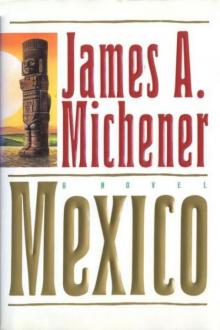 Mexico
Mexico The World Is My Home: A Memoir
The World Is My Home: A Memoir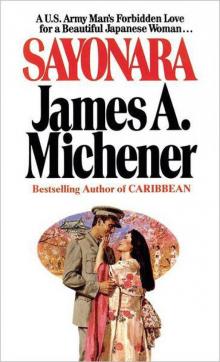 Sayonara
Sayonara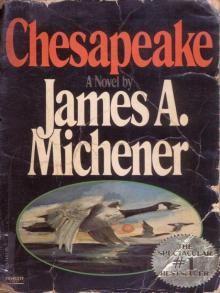 Chesapeake
Chesapeake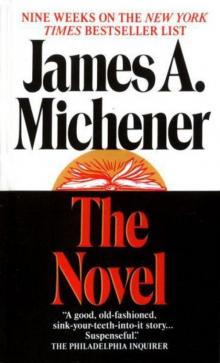 The Novel
The Novel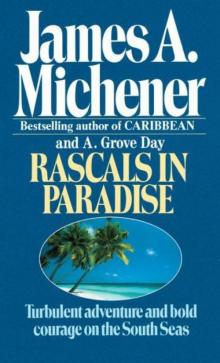 Rascals in Paradise
Rascals in Paradise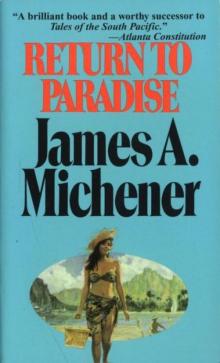 Return to Paradise
Return to Paradise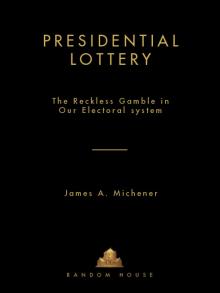 Presidential Lottery: The Reckless Gamble in Our Electoral System
Presidential Lottery: The Reckless Gamble in Our Electoral System The Source
The Source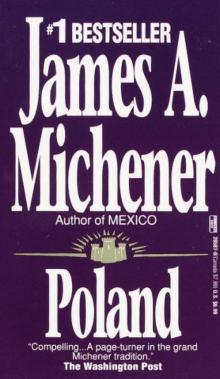 Poland
Poland Space
Space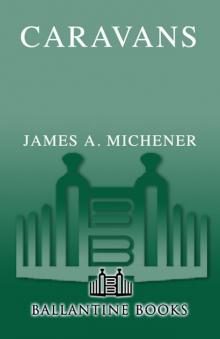 Caravans
Caravans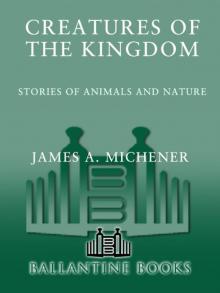 Creatures of the Kingdom: Stories of Animals and Nature
Creatures of the Kingdom: Stories of Animals and Nature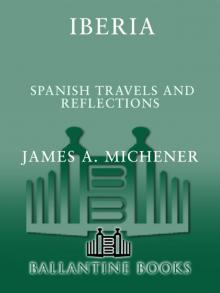 Iberia
Iberia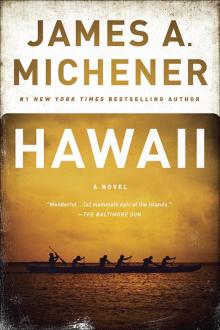 Hawaii
Hawaii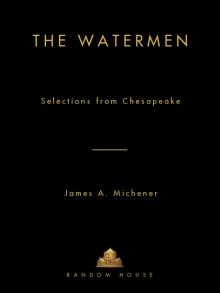 The Watermen: Selections From Chesapeake
The Watermen: Selections From Chesapeake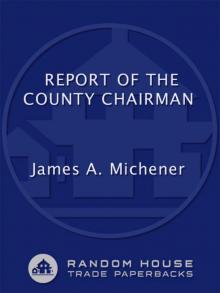 Report of the County Chairman
Report of the County Chairman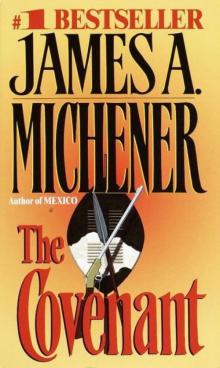 The Covenant
The Covenant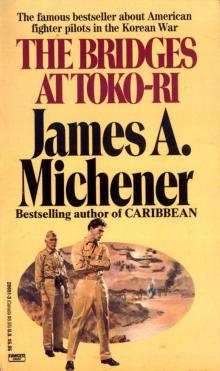 The Bridges at Toko-ri
The Bridges at Toko-ri Matecumbe
Matecumbe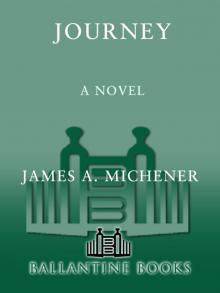 Journey: A Novel
Journey: A Novel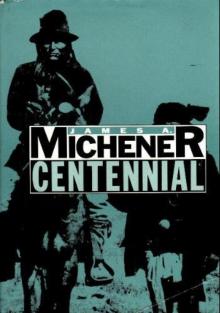 Centennial
Centennial Sports in America
Sports in America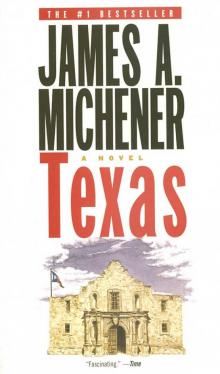 Texas
Texas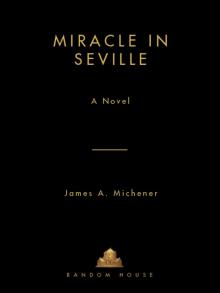 Miracle in Seville
Miracle in Seville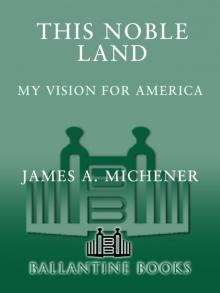 This Noble Land: My Vision for America
This Noble Land: My Vision for America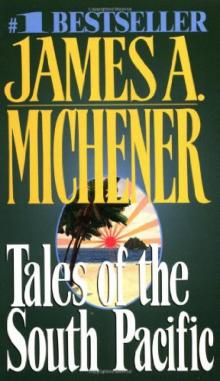 Tales of the South Pacific
Tales of the South Pacific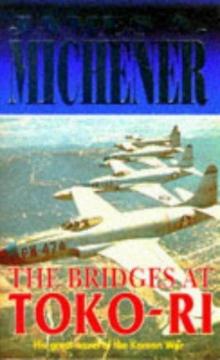 Bridges at Toko-Ri
Bridges at Toko-Ri Space: A Novel
Space: A Novel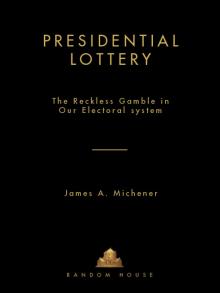 Presidential Lottery
Presidential Lottery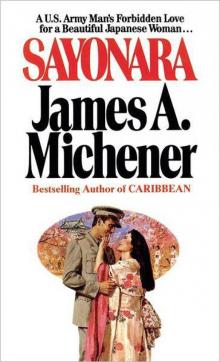 Sayonara: A Novel
Sayonara: A Novel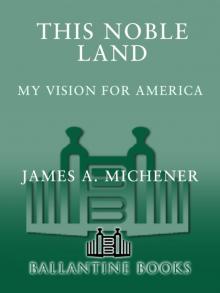 This Noble Land
This Noble Land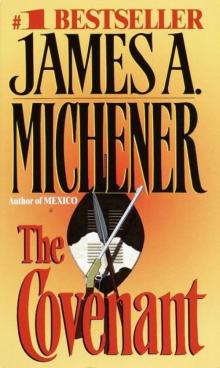 The Covenant: A Novel
The Covenant: A Novel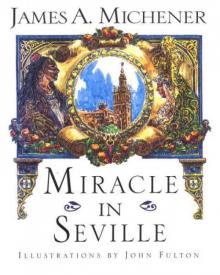 Miracle in Seville: A Novel
Miracle in Seville: A Novel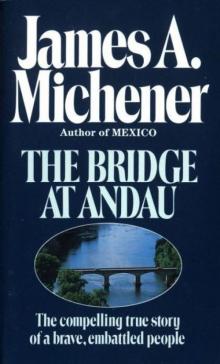 The Bridge at Andau
The Bridge at Andau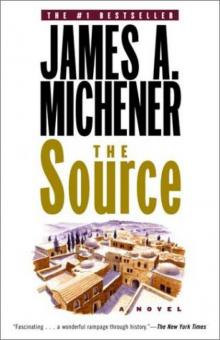 Source
Source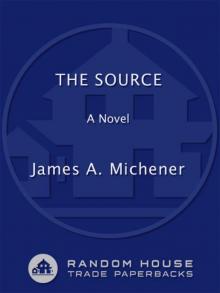 The Source: A Novel
The Source: A Novel Journey
Journey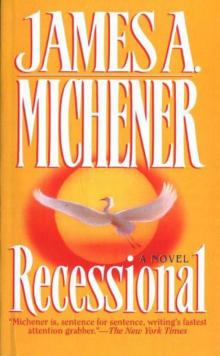 Recessional: A Novel
Recessional: A Novel Legacy: A Novel
Legacy: A Novel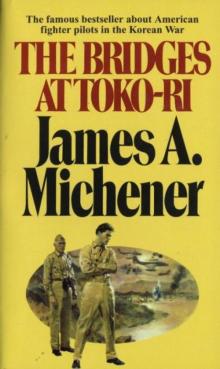 The Bridges at Toko-Ri: A Novel
The Bridges at Toko-Ri: A Novel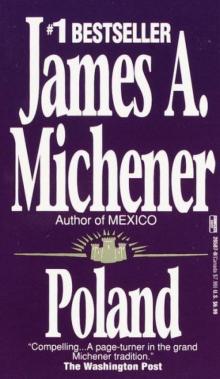 Poland: A Novel
Poland: A Novel